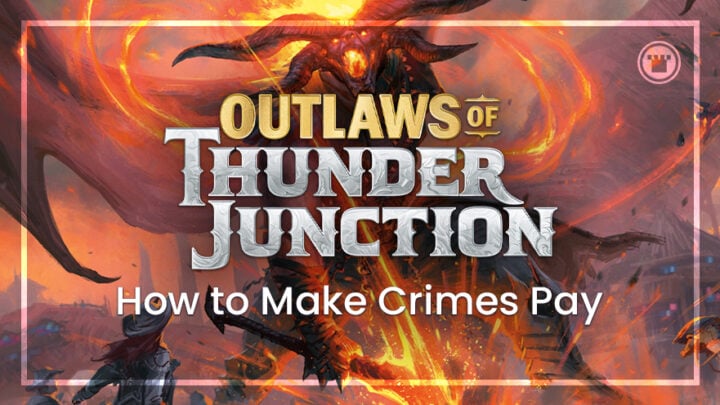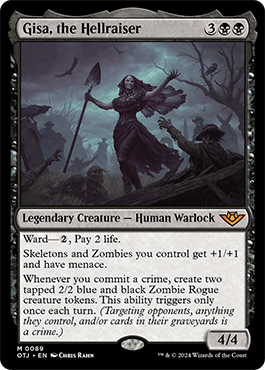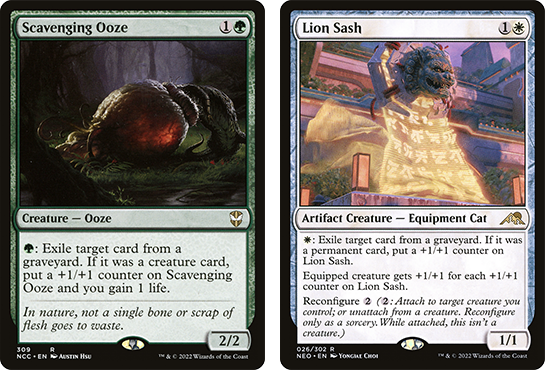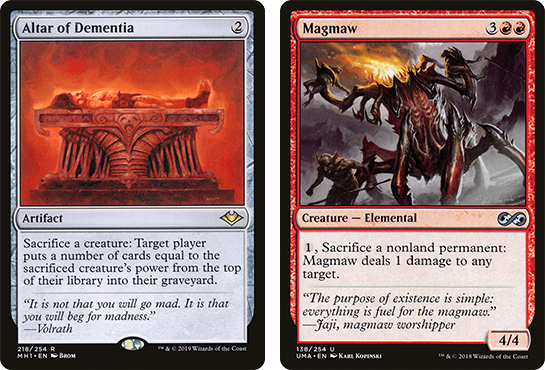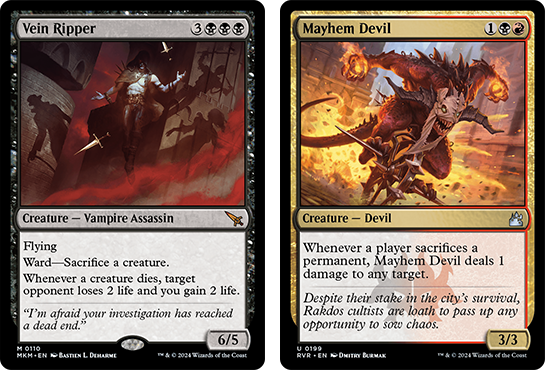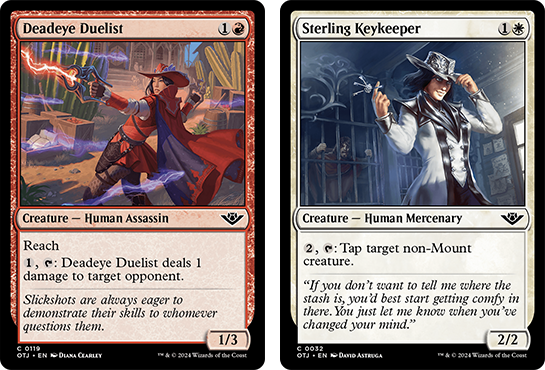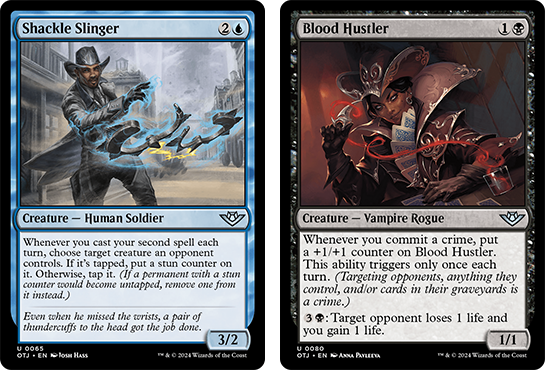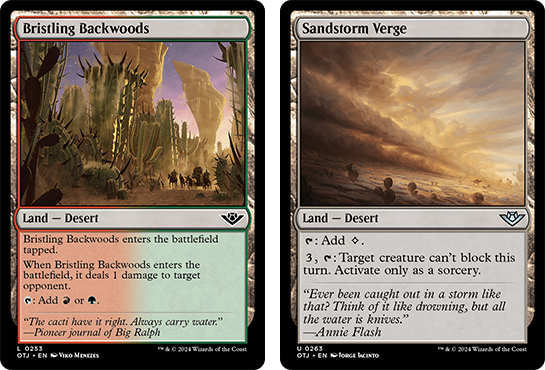The Outlaws of Thunder Junction previews have made it very clear: Magic’s newest plane is a wretched hive of scum and villainy. Every named bad guy in the history of the game (who isn’t dead or in plane jail) is riding around town, shooting up the new frontier and causing cowboy chaos.
The Thunder Junction design team have embraced this theme by making new cards which reward you for controlling outlaws and committing crimes. That may sound confusing at first, because most spells deployed during your average multiversal cardboard wizard fight would warrant jail time if you judge them by common law. Some of them are literally named after felonies!
But don’t worry about finding yourself a Demonic Attorney – these cards only care about a single Magic-specific criminal statute, one defined by Wizards specifically for Thunder Junction. The crime in question? Targeting an opponent, anything they control on the battlefield or stack, or any cards in their graveyard.


INDICATORS OF GUILT
Experienced players can probably already tell that this definition of “committing a crime” includes a huge number of mundane, expected plays – removal spells, countermagic, Duress, burn, auras, and so on. If your constructed deck needs to occasionally commit a crime for whatever reason, you shouldn’t need to upend your gameplan to meet that requirement.
But there will still be situations where the efficiency and clever planning of master criminals will shine through compared to the work of their less devious colleagues. Finding cards which commit crimes more than once or at instant speed will immediately multiply the value of any Thunder Junction payoff cards you’re building around.
There’s going to be a real spectrum of crime enablers, and which ones you want depends on how heavily your deck relies on constant crimes to work out. As the Cephalid Breakfast combo proves, it’s possible to find niche effects which can turn on your weird triggers efficiently and repeatedly… so long as you don’t need those effects to actually contribute anything else useful.
For decks aiming to maintain a steady crime spree turn after turn, these sorts of enablers will pay for themselves – but you need a fairly high density of high-impact payoffs to justify them.
There’s also less incentive to commit this hard for guaranteed crimes, because most crime triggers seem limited to once per turn. That means no (easy) infinite crime combos, and less reason to play a spell whose only use is ticking the “crime this turn” box.
WE’RE GONNA NEED A TRIGGER-MAN
All other potential enablers are going to fall somewhere between Spatial Binding and Leyline Binding on the efficiency-practicality scale.
Again, given the once-per-turn limit on your payoff triggers, the real prizes will be permanents which would already be borderline playable, but happen to be worded in a way which makes crime effortless. One of the most promising categories is graveyard hate, since exiling cards from yard is an effect which usually comes cheap.
You can also look for abilities paid for with life, sacrifices, discard, and other alternate resources which could help squeeze in more crime for less mana.
Lastly, there are enablers which are actually triggers themselves, but with conditions so commonplace that they will reliably generate “free” crimes for you. This category actually seems to have the strongest cards overall, so long as you’re okay with losing some control over when your crimes take place.
CAN’T DO ANYTHING IN THIS TOWN
So it seems like it won’t be that hard to commit crimes in Constructed decks, but what about Thunder Junction itself? How common are these sorts of crime-enabling effects in the set built around the mechanic?
I won’t delve too deeply into OTJ Limited right now (wait for my Draft Guide in a couple weeks), but I expect that crime will have a similar dynamic to Bargain in Wilds of Eldraine. At first glance, both mechanics seem trivial to switch on – and they are in other formats – but the cards within that set have been balanced to ensure it’s a meaningful challenge in Draft or Sealed.
Deadeye Duelist might be the most easily accessible source of crime for those trying to maximize triggers; it’s cheap, it’s common, and it’s an Outlaw to boot. In comparison, Sterling Keykeeper isn’t totally uneconomical – but it’s definitely on the expensive side for what it does, demonstrating the additional value the set designers placed on crimes.
Shackle Slinger will be easier to trigger than it looks thanks to set mechanics like Plot, and offers the free, trigger-based kind of enabler we discussed above. Blood Hustler is both enabler and payoff, which explains its weaker stats and higher ability cost. But black has more than enough targeted spells and ETBs in this set to ensure it always grows.
There’s not too many of these reliable crime-committers in Thunder Junction, and it’s likely players will be forced to settle for less efficient options from time to time. Voracious Varmint is a good example of how crime triggers could add another layer of decision making to relatively mundane plays. Will you leave an enemy aura alive until your Gisa, the Hellraiser hits play? How much trigger value would you need to justify pointing the Varmint at a Treasure token?
But for the most part, you shouldn’t be too pressured to sacrifice cards just to add another line to your criminal record. The new common two-color Deserts, as well as the uncommon Sandstorm Verge, give you even more flexibility to commit a crime in any situation without giving up major resources. I do expect them to be highly picked though, so remember the slogan: pick a Desert, save a Varmint!
COMMITMENT ISSUES
Even with the set spoilers now available, it’s difficult to tell how important committing crimes will be outside of Thunder Junction Limited.
Actually fulfilling the conditions seems fairly easy; almost free for Constructed decks in 1v1. Commander players who want to trigger Freestrider Lookout four times per turn cycle will actually need to do some work though, and I’m interested to see what kind of devious schemes develop to enable that.
In Limited, crimes seem like something you will need to pay attention to, but enablers will be available for decks that want them. How powerful and attractive they are will depend on the strength of the payoffs you run. And like any niche trigger type, that will in part depend on the total number of payoffs you can grab for your pool.
If you are playing multiple colors and can combine the strongest cards from across Outlaws of Thunder Junction, I could realistically see a very powerful crime engine coming together for Limited or Standard. Most other formats are more likely to dabble in crime, running one or two cards which care for the mechanic and relying on their existing interaction to fulfill the actual crime part.
That flexibility is actually my favorite part of this whole mechanic, and I’m really looking forward to experimenting with the exact right amount of crime focus for each deck. Even if the full crime-centric archetype never emerges as a contender, the power ceiling on the rares is high enough to earn a spot in all sorts of archetypes. Underestimate the Outlaws of Thunder Junction at your own peril!

Tom’s fate was sealed in 7th grade when his friend lent him a pile of commons to play Magic. He quickly picked up Boros and Orzhov decks in Ravnica block and has remained a staunch white magician ever since. A fan of all Constructed formats, he enjoys studying the history of the tournament meta. He specializes in midrange decks, especially Death & Taxes and Martyr Proc. One day, he swears he will win an MCQ with Evershrike. Ask him how at @AWanderingBard, or watch him stream Magic at twitch.tv/TheWanderingBard.

